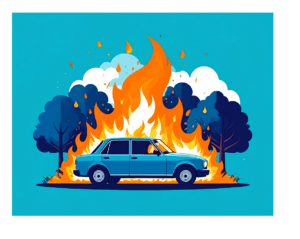Module 2 – Respecting Patient Rights
Ethics Case 2.4
Burns, Bandages, & Clorox Baths
Mr. Cowart, a 25-year-old Air Force reservist aspiring to be a commercial pilot, was severely injured in an unexpected explosion while assessing property with his father for their real estate business. The blast occurred when their car ignited propane gas that had leaked from a deteriorated refinery pipe into the surrounding area. Without warning, a fiery explosion erupted all around the men, trapping them in a fiery inferno. Instinctively, Mr. Cowart sprinted from the car but was forced to hurl himself through three walls of fire before finally collapsing on the dirt road in what can only be described as “unimaginable pain.”
A passerby saw the explosion and quickly drove over to help. Upon discovering Mr. Cowart laying in the road, the man approached to offer aid. But to his surprise, Mr. Cowart simply asked him for a gun, crying out “I’m a dead man. Can’t you see I’m a dead man? I’m going to die anyway. I’ve got to put myself out of this misery!” The man compassionately refused Mr. Cowart’s plea and called for an ambulance.
 While in the ambulance en route to the hospital, Mr. Cowart refused all treatments and watched as his father died from his injuries. Once the ambulance arrived at the hospital, the burn-unit medical team immediately began treating Mr. Cowart, despite his continuing objections and refusals. They assessed Mr. Cowart as having second and third-degree burns to over 65% of his body, including to his face and hands. Mr. Cowart’s injuries are so severe that they render him unable to move and make him unable to physically resist the care of the medical team. When questioned about the decision to treat Mr. Cowart’s injuries, the attending physician explained that “burn victims almost always refuse care initially, due to the pain and shock of the situation, but they often later come to accept that the care was in their best interest.”
While in the ambulance en route to the hospital, Mr. Cowart refused all treatments and watched as his father died from his injuries. Once the ambulance arrived at the hospital, the burn-unit medical team immediately began treating Mr. Cowart, despite his continuing objections and refusals. They assessed Mr. Cowart as having second and third-degree burns to over 65% of his body, including to his face and hands. Mr. Cowart’s injuries are so severe that they render him unable to move and make him unable to physically resist the care of the medical team. When questioned about the decision to treat Mr. Cowart’s injuries, the attending physician explained that “burn victims almost always refuse care initially, due to the pain and shock of the situation, but they often later come to accept that the care was in their best interest.”
Treating severe burn injuries, like those Mr. Cowart sustained, can take up to a year in the hospital. If the treatments are continued, there is greater than an 85% chance that Mr. Cowart will live, but he will never regain his sight and his hands will likely have to be amputated. If his treatments are stopped within the next few days, there is greater than a 90% chance that he will quickly contract an infection and subsequently die. This information has been clearly communicated to Mr. Cowart, who has now been a patient in the burn unit for eight days.
Mr. Cowart acknowledges that without treatment he will very likely die, yet each day he continues to assert that he wants the treatments to stop. He says that being submersed in the Clorox bath feels like torture and that the daily changing of his bandages feels like he’s routinely being “skinned alive.” Although Mr. Cowart is being given medication to help manage his pain, the maximum allotted dosage is inadequate to deal with the severity of his injuries, and the treatments are necessary for preventing infection and allowing his skin to heal.
Mr. Cowart’s mother, Ada, is the only close family he has left. The doctors met with Ada on the second morning of his hospitalization, and she was adamant that they do everything possible to keep her son alive. She reminded them that she just lost her husband in the accident, and that she’s afraid of losing her only child as well. She also talked about his plans to become a commercial pilot and all the enthusiasm he had shown for the future, as well as the fact that she “wants him to have time to realize his responsibilities to God, and to come to the realization of what he should be doing with his life.” As a devout Christian, she says that it’s important her son doesn’t die before accepting the teachings of her church.
Yesterday, during Mr. Cowart’s seventh day in the burn unit, a nurse asked him about his repeated refusals of treatment, again explaining how important the treatment was for his recovery. Mr. Cowart confided to the nurse that “it’s not that I don’t want to live, but I don’t want to live in the pain, and I don’t want to live in the physical condition I’ll have to live in – completely dependent on other people.” This helped her to understand that Mr. Cowart’s objection isn’t to living itself, but to living with constant pain and complete dependence on others due to his blindness and loss of hand function. Mr. Cowart also clearly recognizes that without use of his sight or his hands, he will have an extremely difficult recovery and an uncertain future if he survives.
Confident in the effectiveness of their treatment plan, but growing concerned by Mr. Cowart’s continued refusal, the medical team has requested an ethics consultation to evaluate Mr. Cowart’s decision-making capacity and determine the appropriate course of action.
Click Here to Download Ethics Case 2.4 pdf

